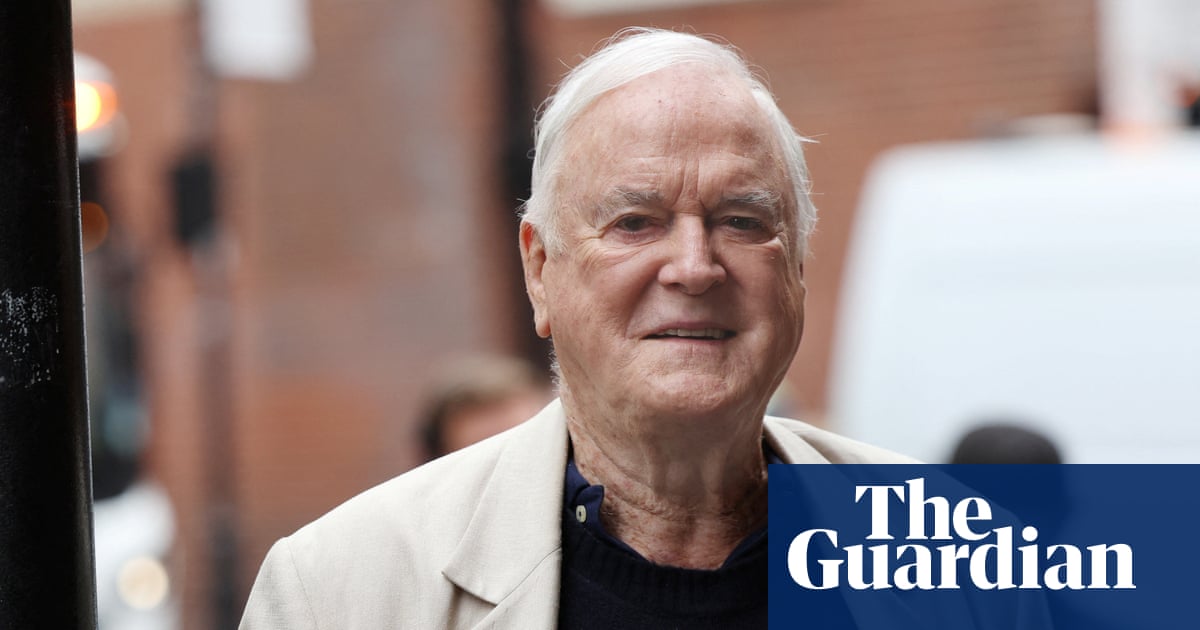John Cleese said that he decided to cut the N-word from a scene in his West End Fawlty Towers revival because in contemporary Britain there are too many âliteral-minded peopleâ who âdonât understand ironyâ.
Cleese was speaking at the media launch for the West End theatrical adaptation of the classic comedy, which follows a repressed hotelier trying to control his chaotic staff. The TV show finished in 1979 after two series that are widely regarded to contain some of the best-ever British sitcom writing.
The new two-hour version features scenes from three episodes of the series: The Hotel Inspector, Communication Problems, and The Germans, which originally featured a scene in which a character used racial slurs, including the N-word, while discussing a cricket match.
âWhenever youâre doing comedy youâre up against the literal-minded, and the literal-minded donât understand irony and if you take them seriously you get rid of a lot of comedy,â Cleese said, explaining the reason for altering the script.
âThey donât understand metaphor, irony or comedy exaggeration ⦠theyâre not playing with a full deck.â
He also defended the overtly racist comedies of the 1970s, such as Till Death Do Us Part, which featured the character Alf Garnett, who was played by Warren Mitchell and was known for his racist outbursts.
âPeople were roaring with laughter at him, not with him, but there were also people saying: âThank God these things are being said at last,ââ said Cleese.
In a recent piece for the Telegraph, Cleese said that he yearned for âa return to what seemed to be a happier, friendlier, calmer, more ironic cultureâ, while admitting that heâd considered keeping the N-word in the adaptation but decided âitâs not worth the troubleâ.
Fawlty Towers is the latest sitcom from the 1970s, 80s and 90s to make a stage transfer.
Drop the Dead Donkey: The Reawakening!, The Good Life, Some Mothers Do âAve âEm, The Fast Show and Only Fools and Horses have already been adapted (Fawlty Towers is directed by Caroline Jay Ranger, who also directed Only Fools and Horses).
One critic said âa thirst for nostalgia and familiarityâ was behind the trend, while another argued that audiences missed âbig, unifying pop-cultural Âtelevision events from the days before Âmultiple channels, streaming and the diffuseness of Âcontentâ.
Cleese also said there had been âtoo much changeâ in British society over recent years.
âThereâs been too much change. Everyone is getting very anxious and people behave in a ratty sort of way and are more likely to become more literal-minded,â he said. âIâm not sure what you do about it, maybe uninvent the internet?â
He also believes that Britain has undergone âAmericanisationâ and is now too obsessed with earning money and status, while the âlower middle classâ people he grew up with in Weston-super-Mare in the 1950s were more content to âdo their job well â¦[and] live a good lifeâ.
âOne of the sad things about our culture now is that weâve been infected by the American view that if youâre not rich or famous youâre a bit of a failure,â he added.
Cleese is also working on a TV revival of Fawlty Towers with his daughter, where Basil Fawlty will end up in the Caribbean helping his estranged daughter, who is also a hotelier. Cleese promised: âHe will still be repressed and trapped.â
Fawlty Towers: The Play will open on Wednesday 15 May at Londonâs Apollo Theatre on Shaftesbury Avenue in the West End, and will run until 28 September.



